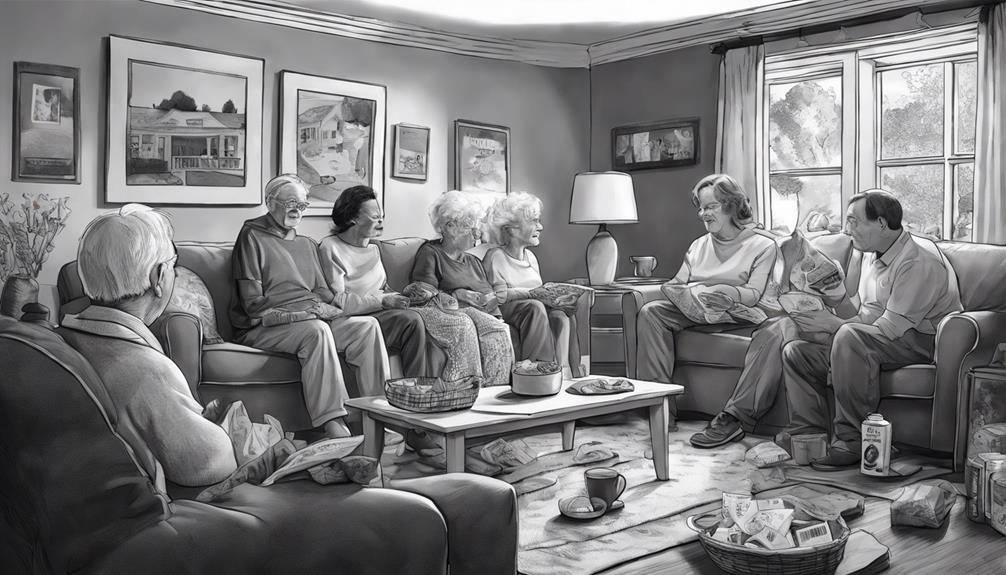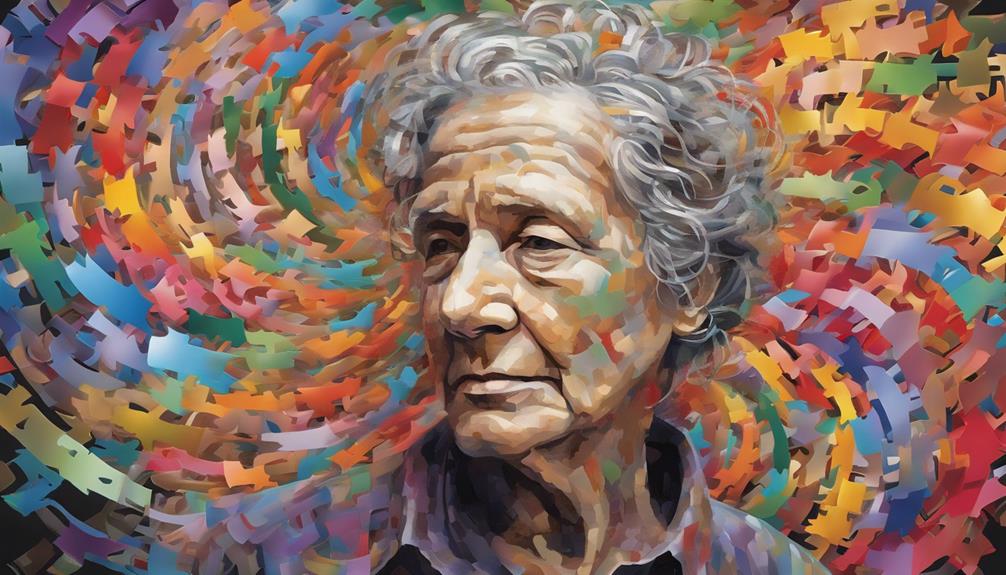Dementia Care
3 Must-Watch Movies About Dementia
Lose yourself in the poignant world of 'Dementia Movies,' where memory loss reveals hidden truths and resilience faces its ultimate test.

Not many people realize this, but the movie industry has created a variety of films that skillfully delve into the complex realities of dementia and Alzheimer’s disease. These movies effectively depict the challenges of memory loss and the impact it has on individuals and their families.
As we delve into this cinematic realm, we will uncover how these stories not only capture the challenges but also celebrate the resilience and humanity that shines through in the face of such hardships.
Key Takeaways
- Dementia movies explore love, family, and memory loss themes.
- Emotional journey of those affected by Alzheimer's depicted in films.
- Caregiving responsibilities and family dynamics central in dementia films.
- Insights into navigating Alzheimer's complexities within family dynamics offered.
Top Dementia Movies to Watch
When considering the top dementia movies to watch, it's essential to explore compelling narratives that authentically depict the complex realities of individuals living with cognitive decline. One poignant portrayal is seen in 'Still Alice' (2014), where Julianne Moore delivers a powerful performance as a linguistics professor facing early-onset Alzheimer's. Through her character, the audience witnesses the profound impact of the disease on not just the individual but also on their loved ones.
In 'The Notebook' (2004), based on Nicholas Sparks' novel, the theme of enduring love is tested by Alzheimer's, showcasing the unwavering dedication of a husband to his wife as she battles the condition. Julie Christie's Oscar-nominated role in 'Away From Her' (2007) offers a heart-wrenching depiction of a woman voluntarily entering a care home due to Alzheimer's, highlighting the complexities of relationships in the face of this disease.
These films authentically capture the essence of dementia, exploring themes of love, friendship, and family dynamics in the context of cognitive decline, making them essential viewing for anyone seeking a deeper understanding of this challenging condition.
Must-See Films on Dementia

Exploring the emotional impact of dementia through cinema reveals the intricate layers of human experience intertwined with cognitive decline. When it comes to understanding the complexities of Alzheimer's and dementia, certain films stand out as must-sees for their poignant portrayal of the challenges faced by individuals and their loved ones. Below is a curated list of movies that expertly capture the essence of dementia:
| Movie Title | Key Highlights |
|---|---|
| Still Alice (2014) | Julianne Moore's Oscar-winning performance as a linguistics professor facing early-onset Alzheimer's. |
| Away From Her (2007) | Julie Christie's Oscar-nominated role as a woman who chooses to enter a care home due to Alzheimer's. |
| The Savages (2007) | Siblings played by Laura Linney and Philip Seymour Hoffman navigating their father's dementia. |
These films delve into themes of memory loss, love, friendship, and the impact of dementia on individuals and their relationships. By watching these movies, viewers can gain a deeper understanding of the emotional journey experienced by those affected by Alzheimer's and dementia.
Powerful Dementia Movie Recommendations
To further enhance our understanding of dementia's emotional impact, let's highlight some powerful movie recommendations that intricately portray the complexities of Alzheimer's and cognitive decline.
- 'Still Alice' (2014) – This film delves into the life of a linguistics professor, Alice, who grapples with early-onset Alzheimer's, showcasing the profound challenges of memory loss and its impact on family dynamics and relationships.
- 'The Notebook' (2004) – Through the heartfelt story of Noah and Allie, this movie poignantly illustrates the unwavering love and dedication of a partner caring for someone with Alzheimer's, emphasizing the importance of unconditional love and caregiver support.
- 'Iris: A Memoir of Iris Murdoch' (2001) – By portraying Iris Murdoch's Alzheimer's journey, this film beautifully captures the essence of unconditional love amidst the struggles of cognitive decline. It sheds light on the caregiver's role, the complexities of memory loss, and the profound impact on relationships, making it a compelling watch for those seeking insight into the challenges and nuances of dementia caregiving.
Emotional Dementia Films List

In emotional dementia films, the portrayal of love, loss, and resilience amidst Alzheimer's and cognitive decline resonates deeply with viewers, offering poignant insights into the complexities of relationships affected by the disease. These films delve into the emotional journey of individuals grappling with Alzheimer's, capturing the challenges faced by both patients and their caregivers.
Family dynamics play a central role in these narratives, showcasing the intricate web of emotions and responsibilities that come with caring for a loved one with dementia. Through poignant storytelling, emotional dementia films shed light on the sacrifices, struggles, and moments of connection that define the caregiving experience.
Themes of resilience and enduring love permeate these movies, illustrating the profound impact of Alzheimer's on relationships and underscoring the strength and vulnerability inherent in such situations. By exploring the emotional landscape of Alzheimer's, these films offer valuable insights into the human experience of navigating the complexities of the disease within the context of love and family dynamics.
Impactful Alzheimer's Movies
Numerous impactful Alzheimer's movies have left a lasting impression on audiences, shedding light on the complexities of the disease and its profound effects on individuals and their relationships. These films provide a glimpse into the challenges faced by those living with Alzheimer's and their loved ones, showcasing the emotional rollercoaster that often accompanies the progression of the disease.
Some notable examples include:
- *'Still Alice' (2014)* – This film follows the journey of Alice Howland, a linguistics professor grappling with early-onset Alzheimer's, highlighting the devastating impact of the disease on her career and relationships.
- *'Away From Her' (2007)* – Featuring Julie Christie's Oscar-nominated performance as Fiona, who makes the difficult decision to move into a care home as her Alzheimer's progresses, showcasing the heart-wrenching realities of memory loss and identity.
- *'The Savages' (2007)* – Through the story of siblings caring for a parent with dementia, played by Laura Linney and Philip Seymour Hoffman, this film delicately balances humor and dignity in portraying the challenges of caregiving and familial bonds amidst Alzheimer's.
Frequently Asked Questions
What Movie Portrays Dementia?
We've identified several films that depict dementia in a poignant and realistic manner. These movies provide insight into the challenges faced by individuals living with dementia and their caregivers.
Each film offers a unique perspective on the impact of memory loss and cognitive decline, shedding light on the emotional journey of those affected by this condition.
The portrayal of dementia in these movies can help viewers better understand the complexities of this disease.
What Are 3 Things to Never Do With Your Loved One With Dementia?
When caring for a loved one with dementia, it's important to remember several key strategies. First, avoid arguing or correcting them. Instead, focus on creating a calm and reassuring environment. Refrain from using complex language that may confuse them and never leave them unattended in unsafe situations. Prioritizing their safety and well-being is crucial. Take the time to allow them to process information at their own pace and avoid overloading them with tasks or activities.
What Is the Movie on Netflix About Alzheimer's?
The movie on Netflix about Alzheimer's is 'The Father.' It provides a poignant and realistic portrayal of living with dementia. It depicts the challenges faced by individuals with dementia and their caregivers, showcasing the emotional complexities and impact on relationships and identity.
With powerful performances, 'The Father' offers a moving exploration of Alzheimer's disease. It sheds light on the struggles and realities of those affected by this condition.
What Is the Movie About the Woman Who Gets Dementia?
We recently encountered a movie that delves into the journey of a woman grappling with dementia. The narrative skillfully captures the complexities of memory loss and its profound effects on her life.
As the story unfolds, the viewer witnesses the emotional toll this condition takes on her and those around her. The film's portrayal of dementia is both poignant and enlightening, shedding light on the challenges faced by individuals living with this condition.
Conclusion
As we journey through the realm of dementia movies, we navigate the intricate tapestry of emotions and relationships woven within these cinematic masterpieces.
Like a compass guiding us through the labyrinth of memory loss, these films illuminate the resilience of the human spirit and the power of love in the face of adversity.
Let's continue to explore and embrace the profound impact of Alzheimer's and dementia on individuals and their caregivers, fostering empathy and understanding along the way.
Albert brings a wealth of knowledge and expertise to our writing team. With a background in caregiving and a deep understanding of the challenges faced by caregivers, Albert’s writing resonates with authenticity and empathy. He is committed to delivering high-quality content that empowers and supports caregivers on their journey.
Dementia Care
10 Heartfelt Dementia Poems to Stir Emotions
Yearning for solace in the labyrinth of fading memories, 'Dementia Poem' invites you to unravel the profound tapestry of emotions waiting to be discovered.

In a world where memories fade as fast as leaves in autumn, we discovered a moving piece that truly touches the soul. The words in ‘Do Not Ask Me to Remember’ inspire us to delve into the profound depths of emotional bonds and the human spirit, even when faced with the unyielding grasp of dementia.
As we journey through the labyrinth of verses, we uncover a treasure trove of insights waiting to be unearthed, offering a glimpse into the profound impact of poetry on the human spirit.
The Art of Dementia Poems
Exploring the intricacies of crafting dementia poems reveals a profound journey of empathy and understanding. Within the walls of a care home, where every heartbeat echoes a story of resilience, dementia poems serve as windows into the souls of those affected by memory loss. Caregivers, amidst the challenges and joys, find solace in the verses that speak of their unwavering love and dedication. Through the lens of poetry, the complexities of navigating life with dementia are laid bare, highlighting the importance of patience and compassion in every interaction.
In the quiet moments shared between caregivers and residents, poetry becomes a bridge connecting past and present, weaving a tapestry of shared memories and emotions. The care home transforms into a sanctuary where words carry the weight of unspoken feelings, offering comfort and understanding to all who dwell within its walls. As poets craft verses that echo the humanity present in every caregiving journey, they illuminate the path towards a future filled with empathy and grace.
Expressing Emotions Through Poetry

Delving into the realm of dementia caregiving through poetry offers a poignant avenue for expressing intricate emotions and navigating the complexities of this journey with grace and understanding. Poetry serves as a heartfelt medium to articulate the myriad of feelings that arise in the realm of dementia care.
These poems provide a raw and authentic glimpse into the emotional rollercoaster that comes with looking after loved ones with dementia. Through verses that echo personal insights and reflections, individuals can share their coping mechanisms and shed light on the profound impact dementia has on relationships.
The poems often underscore the significance of love, patience, understanding, and the dire need for support in the challenging terrain of dementia care. By encapsulating these experiences in poetic form, caregivers not only find solace in their expression but also create a platform for raising awareness, fostering empathy, and forging connections with others walking similar paths in the realm of dementia care.
Impact on Dementia Awareness
As we reflect on the emotional depth captured in dementia poems, it becomes evident that these poetic expressions play a pivotal role in raising awareness about the challenges faced by individuals living with the condition and their caregivers. Through the power of poetry, we can shine a light on the struggles, emotions, and realities of those impacted by dementia. Here are three significant ways in which dementia poems impact awareness:
- Educating about Care Challenges: Dementia poems provide insights into the daily hurdles faced by both individuals with dementia and their caregivers. They shed light on the need for patience, understanding, and specialized care to support those living with the condition.
- Promoting Compassionate Care: By sharing personal experiences and emotions through poetry, individuals can cultivate a deeper sense of empathy and compassion towards those affected by dementia. This heightened awareness encourages a more caring and supportive environment for individuals and their caregivers.
- Inspiring Supportive Communities: Dementia poems foster a sense of community and solidarity among individuals touched by the condition. They encourage open discussions, mutual support, and initiatives to improve dementia care practices, creating a more compassionate and inclusive society.
Finding Comfort in Poetic Verses

Finding solace in poetic verses, individuals touched by dementia can often discover a sense of understanding and connection amidst the challenges they face. I've always found that poetry has this incredible ability to convey emotions and experiences in a way that resonates deeply with the heart. When it comes to dementia, these verses become even more poignant, offering a glimpse into the complex world of those living with the condition and their caregivers.
I've always believed that poetry has a unique power to provide comfort and healing during difficult times. The emotional insights shared through dementia poems help us navigate the rollercoaster of emotions that come with caregiving. They remind us of the importance of love, patience, and empathy in supporting individuals with dementia. Through these verses, we can better understand the impact of dementia on relationships, memories, and communication, fostering a greater sense of awareness and compassion for those affected by this challenging condition.
Empathy and Solace in Words
In understanding the emotional complexities of dementia, we're drawn to the solace and empathy found within the heartfelt words of poetry. Through these poetic expressions, we can truly grasp the depth of the experiences faced by individuals and caregivers dealing with dementia.
- Validation in Shared Emotions: Poems on dementia offer a profound sense of validation, allowing individuals to feel understood and connected in their struggles and triumphs.
- Empathy for the Journey: These poems reflect the challenges and joys of caring for loved ones with dementia, fostering empathy and understanding among readers towards those navigating this difficult journey.
- Community and Support: By emphasizing empathy, patience, and understanding, these poems create a sense of community and support for individuals affected by dementia, reminding them that they aren't alone in their experiences.
In the realm of dementia, where communication can be complex and emotions intense, finding solace and empathy in the power of poetic words can offer a beacon of light and understanding in the midst of uncertainty.
Frequently Asked Questions
What Is the Poem About Dementia?
We understand the impact of dementia on relationships and memories. It challenges us to navigate through the emotions and coping mechanisms.
Raising awareness and involving youth is crucial for understanding dementia.
We've experienced the emotional journey of caring for loved ones with dementia. It's a poignant reminder of the importance of empathy and support for those affected by this condition.
What Are 3 Things Not to Say to Someone With Dementia?
When speaking to someone with dementia, it's important to be mindful of our words and actions. Three things we should avoid saying are:
- 'You should remember this'
- 'Do you remember me?'
- 'You're wrong'
These phrases can cause frustration, anxiety, and agitation in individuals with dementia. Instead, we should:
- Use simple language
- Avoid rushing them
- Offer support and reassurance in a compassionate manner.
What Is the Average Age of Death for Someone With Dementia?
We've learned that the average age of death for someone with dementia is typically around 80 years old.
It's essential to remember that individuals with dementia often have a shorter life expectancy due to complications like infections and falls.
Factors such as the type of dementia, overall health, and access to quality care can influence their age of death.
Caregivers play a crucial role in providing support and ensuring a dignified end-of-life experience for those with dementia.
What Stage of Dementia Is Sundowning?
Sundowning is a symptom of mid to late-stage dementia. It often brings increased agitation, confusion, and behavioral changes in the late afternoon or evening. Though the exact cause isn't fully understood, disruptions in the body clock or changes in brain function may play a role.
Caregivers can help manage sundowning by maintaining a consistent routine, reducing noise and stimuli in the evening, and creating a soothing environment for those with dementia.
How Can Dementia Poems and Tattoos Help in Expressing Emotions and Memories?
Dementia poems and meaningful dementia tattoos symbolizing love can be powerful ways to express emotions and memories. Both can serve as a tangible reminder of love and connection, providing comfort and a sense of continuity for those coping with the challenges of dementia.
Conclusion
As we reflect on the power of dementia poems like 'Do Not Ask Me to Remember,' we're reminded of the deep emotional journey faced by those affected by Alzheimer's disease. Through the art of poetry, we can express complex emotions, raise awareness, and find solace in shared experiences.
Can words truly capture the essence of love, patience, and understanding needed to support individuals living with dementia? Let's continue to embrace empathy and compassion in our caregiving journey.
Albert brings a wealth of knowledge and expertise to our writing team. With a background in caregiving and a deep understanding of the challenges faced by caregivers, Albert’s writing resonates with authenticity and empathy. He is committed to delivering high-quality content that empowers and supports caregivers on their journey.
Dementia Care
10 Meaningful Dementia Tattoos Symbolizing Love and Memory
Intrigued by the profound symbolism and emotional depth, delve into the world of dementia tattoos to uncover their hidden meanings and powerful impact.

As we navigate the complex paths of showing unity and honoring memories, it’s hard not to question why more and more individuals are choosing to get Alzheimer’s tattoos. These tattoos share narratives that go beyond words, creating a tapestry of emotions and support to increase awareness about Alzheimer’s.
But what lies beneath the surface of these intricate designs goes beyond mere aesthetics; there's a deeper connection waiting to be uncovered, a connection that resonates with both the wearers and observers, beckoning us to explore further into the intricate realm of symbolism and support.
Rising Popularity of Dementia Tattoos
Dementia tattoos have been increasingly embraced as a poignant symbol of memory loss and a means to raise awareness about Alzheimer's disease. For many, these tattoos represent more than just ink on skin; they hold a deep significance. Choosing a dementia tattoo for a loved one with Alzheimer's means something profound – it's a visible display of unwavering support and a constant reminder of the cherished memories shared.
The popularity of dementia tattoos reflects a growing understanding of the emotional impact of Alzheimer's on both patients and caregivers. These tattoos serve as a powerful connection point, sparking conversations and fostering empathy. Through these tattoos, individuals find solace in honoring their loved ones and expressing solidarity with others facing similar challenges. Each stroke of the tattoo needle is a testament to the enduring bond between individuals and their loved ones affected by Alzheimer's.
Practical Information and Medical Details

In providing practical information and medical details regarding tattoos associated with memory loss, it is essential to understand the significance and potential implications of these artistic expressions. Dementia tattoos, often featuring forget-me-not flowers, serve as poignant symbols of memory loss and are significant in raising awareness about Alzheimer's disease. Caregivers frequently choose these tattoos as a heartfelt way to express love and support for their loved ones affected by dementia. These tattoos not only act as a reminder to cherish memories but also serve as conversation starters about dementia and Alzheimer's, fostering connections and honoring those impacted by the disease.
Medical Details Table:
| Information | Details |
|---|---|
| Tattoo Safety | Ensure proper hygiene and sterile equipment for tattoo placement. |
| Skin Sensitivity | Individuals with skin conditions should consult a dermatologist. |
| Tattoo Removal Consideration | Reflect on the permanence of tattoos and potential removal options. |
Impact on Caregivers and Loved Ones
As caregivers and loved ones of individuals impacted by memory loss, we witness firsthand the profound impact that dementia tattoos have on fostering understanding and solidarity within our community. These tattoos serve as more than just ink on skin; they represent a deep connection to those battling Alzheimer's and other forms of dementia. Seeing a loved one adorned with a dementia tattoo is a powerful reminder of the challenges they face daily, sparking empathy and compassion in our hearts.
The symbolic nature of these tattoos not only honors the struggles of our loved ones but also unites us in a shared mission to raise awareness and support those affected by memory loss. By wearing these tattoos, we demonstrate our commitment to standing by our loved ones through their journey with dementia. It's a visible sign of our unwavering support and love, a reminder to cherish every moment and advocate for better resources and research in the fight against Alzheimer's disease.
Starting Conversations and Raising Awareness

Starting conversations and raising awareness about memory disorders through dementia tattoos featuring symbolic forget-me-not flowers is a powerful way to honor loved ones and foster meaningful connections within the community. These tattoos, chosen by caregivers to showcase love and support while shedding light on Alzheimer's, serve as poignant conversation starters. By wearing these tattoos, individuals not only pay tribute to those affected by memory loss but also spark discussions that can lead to increased understanding and support for dementia research.
Dementia tattoos act as constant reminders to cherish memories and offer unwavering support to those battling Alzheimer's. The symbolic forget-me-not flowers serve as a beacon of solidarity with caregivers and patients, creating a sense of unity within the community. These tattoos play a crucial role in breaking the silence surrounding memory disorders, encouraging open dialogue, and fostering empathy towards individuals impacted by Alzheimer's. Through these powerful symbols, we can come together to raise awareness, offer compassion, and stand as allies in the fight against dementia.
Considerations and Future Trends
Considering personalized designs and symbols of personal significance, dementia tattoos offer a unique way to honor memories and raise awareness about memory-related disorders.
As we look towards the future of dementia tattoos, we anticipate trends that embrace even more individualized designs, incorporating specific memories or experiences that hold deep meaning for the person or their loved ones. In this evolving landscape, it's important to consider the following:
- Personalized Touch: Future designs may focus on personal stories, incorporating elements that resonate with the individual's unique journey with dementia.
- Symbolic Significance: Choosing symbols that carry personal significance can add layers of meaning to the tattoo, serving as a powerful tribute to the memories shared with the person affected by dementia.
- Awareness and Advocacy: Customizing dementia tattoos with symbols like forget-me-not flowers or puzzle pieces not only adds a personalized touch but also serves as a conversation starter to raise awareness about memory-related disorders in a compassionate and impactful way.
Frequently Asked Questions
Is There a Symbol for Dementia?
Yes, there's a symbol for dementia. It represents the challenges of memory loss and the importance of remembrance.
This symbol serves as a reminder of the impact of Alzheimer's disease on individuals and families. It highlights the need for understanding and support for those affected by dementia.
This symbol can spark conversations and advocacy for research into memory disorders.
What Is a Tattoo That Represents Dementia?
When it comes to tattoos representing dementia, a powerful symbol that resonates with many is the forget-me-not flower. This delicate bloom encapsulates the essence of memory loss and Alzheimer's awareness, serving as a poignant reminder of the impact of dementia on individuals and their loved ones.
The forget-me-not tattoo not only symbolizes love and support but also encourages conversations about this challenging disease and the importance of cherishing memories.
What Is the Quote for Dementia Tattoos?
We often see a quote used for dementia tattoos, 'I will remember for you,' signifying the act of remembering on someone's behalf. This phrase beautifully captures the essence of support and empathy for those facing memory loss.
It's a touching way to show love, understanding, and solidarity with individuals affected by Alzheimer's. The quote symbolizes the importance of cherishing memories and honoring those struggling with dementia.
What Is the Flower for Dementia Awareness?
Forget-me-not flowers symbolize dementia awareness, representing memory loss and remembrance. These flowers are often chosen to raise awareness about Alzheimer's disease.
Caregivers may select dementia tattoos featuring forget-me-nots to express love and support. These tattoos serve as a reminder to cherish memories and advocate for dementia research.
Drawing attention to memory disorders, forget-me-not flowers in tattoos initiate conversations and help build connections within the community.
How Can Dementia Tattoos Symbolize Love and Memory for Alzheimer Patients?
Dementia tattoos serve as thoughtful gifts for Alzheimer patients, symbolizing love and memory. These tattoos can be a permanent reminder of cherished moments or a way to honor a loved one’s name. They provide comfort and a tangible connection, creating a powerful symbol of affection for those affected by Alzheimer’s.
Conclusion
As we reflect on the significance of dementia tattoos, it's important to note that over 50 million people worldwide are currently living with dementia, a number that's expected to triple by 2050.
These tattoos not only serve as beautiful symbols of love and support but also play a crucial role in raising awareness and igniting important conversations about Alzheimer's disease.
Let's continue to stand in solidarity with those affected and advocate for better care and research.
Albert brings a wealth of knowledge and expertise to our writing team. With a background in caregiving and a deep understanding of the challenges faced by caregivers, Albert’s writing resonates with authenticity and empathy. He is committed to delivering high-quality content that empowers and supports caregivers on their journey.
Dementia Care
Assisted Living Dementia Care: A Comprehensive Guide for Families

Assisted living and memory care facilities offer secure and safe settings for elderly individuals with dementia, providing a mix of housing, personal care, and medical services. Tailored to cater to different care requirements at different dementia stages, these communities prioritize improving residents’ quality of life. They create environments that seek to reduce confusion and enable residents to uphold their independence.
The decision to move a loved one into assisted living or memory care is a significant one, fraught with emotional and practical challenges. Understanding the care needed and the services these communities provide is the first step in making an informed choice. Families must recognize the signs that indicate it’s time to consider assisted living, including changes in behavior, safety concerns, and the increasing difficulty of managing daily tasks.

Assisted living and memory care communities offer specialized programs and therapies to support cognitive health and provide sensory stimulation. From music therapy to arts and crafts, these activities are tailored to meet the needs and abilities of seniors with memory issues. By engaging residents in these therapeutic activities, communities aim to slow cognitive decline and improve the overall well-being of their residents.
Choosing the right community involves weighing factors such as the level of care provided, the cost, and the facility’s amenities. Families must consider both the current and future needs of their loved one, ensuring that the community can adapt to changing care requirements. With the right support and resources, families can navigate the journey of dementia care with confidence, knowing their loved one is in good hands.

Understanding Dementia Care in Assisted Living
Dementia care in assisted living communities focuses on supporting residents through various stages of dementia. Staff training is geared towards understanding cognitive decline and providing care that addresses the unique needs of seniors with memory issues. From ensuring safety to offering music therapy, these communities strive to enhance cognitive abilities and minimize confusion. The goal is to create a supportive environment that respects each loved one’s individuality and promotes their well-being.
The Basics of Assisted Living and Memory Care
Assisted living and memory care communities serve as a cornerstone for families navigating the challenges of dementia. They offer a helping hand to residents who need assistance with daily activities while maintaining a focus on memory care. Memory care neighborhoods within these communities are designed to cater to individuals with various forms of dementia, providing a secure and supportive environment that fosters a sense of normalcy and well-being.
Safety and Security Measures
Assisted living communities prioritize the safety and security of seniors with memory issues. They implement measures to minimize confusion and ensure residents’ well-being. This includes controlled entrances and exits to prevent wandering, a common concern among those with dementia. The layout and design of these communities are carefully considered to create a secure environment that promotes independence while safeguarding residents.

Additionally, these communities are equipped with emergency response systems and staff trained to respond to the unique needs of seniors with memory impairments. The aim is to provide a safe space where residents can live with dignity and receive the care they need. Through these safety measures, assisted living communities strive to offer peace of mind to families and a secure home for their loved ones.
Staff Training and Specialized Care Approaches
Supporting residents in assisted living and memory care facilities requires a compassionate and knowledgeable workforce. Staff training focuses on understanding the complexities of dementia and delivering person-centered care that respects each resident’s individuality. Caregivers at memory care facilities are equipped with the skills needed to address the challenges of memory loss, ensuring that residents receive the support they need to navigate their daily lives.

“Memory care communities” adopt specialized care approaches that cater to the unique needs of those living with dementia. This includes therapeutic activities designed to stimulate cognitive abilities and promote emotional well-being. From art therapy to reminiscence sessions, these activities provide meaningful engagement and foster a sense of community among residents. Through dedicated staff and targeted care strategies, assisted living and memory care facilities aim to enhance the quality of life for their residents.
How to Pay for Memory Care: Surprising Tips for Families
When it comes to covering the costs of memory care for a person living with advanced memory conditions, family members often find themselves navigating a complex landscape of financial planning. As dementia progresses, the need for specialized senior care intensifies, pushing families to explore various payment options to ensure their loved ones receive the necessary care without draining their financial resources.
Exploring Insurance and Other Payment Options
One of the first steps for family members is to understand the insurance coverage the person living with dementia has. Many assisted living communities and memory care units accept long-term care insurance, which can significantly offset the costs of advanced memory care. Additionally, health insurance, including Medicare, may cover some aspects of care, particularly if skilled nursing or rehabilitative services are required. It’s crucial to review the policy details and consult with insurance providers to grasp the extent of coverage.

Beyond insurance, there are other avenues to explore. Veterans benefits can be a substantial help for families of seniors living with dementia who served in the military. These benefits often cover a portion of the costs associated with memory care units situated within senior living communities. Furthermore, some families opt for reverse mortgages or utilize life insurance policies’ living benefits feature to fund dementia care. Each option has its considerations and potential impacts on a family’s financial health, making it essential to consult with financial advisors who specialize in senior care planning.
Selecting the Right Community for Your Loved One
Choosing the right assisted living community that offers specialized memory care is critical for family members. It involves evaluating whether a facility can provide a safe, engaging, and supportive environment specifically designed for adults living with Alzheimer’s disease or other dementia forms.

The selection process should prioritize communities that demonstrate a deep understanding of dementia care needs and offer personalized care plans to address the unique challenges each resident faces.
Memory Care in Assisted Living: A Promising Third Option
For family members, finding a balance between independence and personal care for their loved ones can be challenging. Memory care units within assisted living communities offer a promising solution. These units provide an environment specifically tailored for seniors living with dementia, combining personal care assistance, advanced memory therapies, and structured daily activities. This integrated approach ensures that as dementia progresses, residents receive the level of care needed to maintain their quality of life. Furthermore, amenities like chef-prepared meals and therapeutic activities contribute to a fulfilling living experience.

Comparing Services Offered Across Different Facilities
When comparing assisted living communities, it’s essential to look beyond the surface and evaluate the depth of dementia care provided. Key factors include the availability of nursing homes within the community for more advanced care needs, the approach to medication management to ensure residents’ health and safety, and the variety of daily activities designed to engage residents and promote cognitive health. These elements collectively contribute to the overall effectiveness of dementia care programs.
Moreover, the staff’s expertise in dementia care and their ongoing training to stay updated with the latest care approaches can significantly impact the quality of life for residents. Facilities that prioritize a high staff-to-resident ratio and specialized training for their team members often stand out for their superior care and support for individuals living with dementia.
Frequently Asked Questions About Assisted Living Dementia Care
Families often have many questions when considering assisted living dementia care options. Common inquiries revolve around the types of care provided, the costs involved, and how to ensure their loved one will receive the attention and support they need. Addressing these questions is essential for making informed decisions and finding the best care solution for individuals living with dementia.

Senior Care Strategies and Support Systems
Navigating the journey of dementia care requires a comprehensive strategy that includes understanding the care needs of the person living with dementia, researching available senior care options, and establishing a robust support system.
Assisted living communities and specialized memory care units play a crucial role in this strategy by offering environments designed to enhance the quality of life for individuals with dementia. These settings provide tailored care plans, specialized activities, and therapies aimed at slowing the progression of dementia and maintaining cognitive functions for as long as possible.
Additionally, support from other family members, dementia care professionals, and caregiver support groups can provide the emotional and practical assistance needed to manage the challenges of dementia care. Together, these resources form a comprehensive support system that enables families to navigate the complexities of dementia care with greater confidence and resilience.

Enhancing Quality of Life in Dementia Care
Enhancing the quality of life for adults living with Alzheimer’s disease and other forms of dementia is at the heart of effective dementia care. This involves creating a supportive and stimulating environment that addresses the physical, emotional, and social needs of individuals with dementia. Assisted living communities strive to promote well-being and happiness among their residents through personalized care plans, engaging activities, and compassionate caregiving.
Activities and Therapies in Dementia Care
In dementia care, activities and therapies are tailored to engage residents and promote cognitive health. These programs stimulate memory, improve communication skills, and encourage social interaction. By participating in various activities, residents can experience joy and fulfillment, contributing to an overall sense of well-being and quality of life.

Engaging Residents and Promoting Cognitive Health
Assisted living communities and memory care units employ a variety of activities and therapeutic approaches to engage residents and support cognitive health. These may include music therapy, art classes, physical exercise, and memory games.
Such activities are not only enjoyable but also serve to stimulate cognitive functions and foster social connections among residents. Tailoring these activities to individual interests and abilities ensures that each resident can participate fully and benefit from the therapeutic effects.
Beyond organized activities, everyday interactions and routines also play a significant role in promoting cognitive health. Staff members are trained to engage residents in meaningful conversations, assist with personal care tasks in ways that encourage independence, and create a welcoming and inclusive community atmosphere. This holistic approach to care supports the cognitive and emotional well-being of individuals living with dementia.

The Importance of a Supportive Community Environment
Creating a supportive community environment is crucial in specialized memory care. Such an environment fosters a sense of belonging and security for residents, allowing them to thrive despite the challenges of living with dementia. By emphasizing personalized care, respect, and inclusion, assisted living communities help residents maintain their dignity and enhance their quality of life.
Building Relationships with Caregivers and Residents
Strong relationships between caregivers and residents are central to the success of dementia care. These relationships are built on trust, empathy, and a deep understanding of each resident’s unique needs and preferences. Caregivers who take the time to know their residents can provide more personalized care, which significantly impacts the residents’ sense of well-being and happiness.
Moreover, fostering connections among residents themselves is equally important. Social interactions and friendships within the community can offer emotional support, reduce feelings of isolation, and contribute to a vibrant and engaging living environment. Through shared activities and communal spaces, residents have opportunities to form meaningful relationships, enriching their daily lives.

Planning for the Future
As families consider memory care options, planning for the future becomes a priority. This involves evaluating the potential need for skilled nursing care as Alzheimer’s disease or other forms of dementia progress. Understanding the available care approaches and the qualifications of specially trained staff members in various senior living communities can help families make informed decisions that align with their loved one’s needs.
It’s also essential for families to consider the financial aspects of long-term dementia care. The critical steps in financial planning are to explore payment options, understanding the services included in a care plan, and considering the potential for changing care needs over time. This proactive approach allows families to prepare for future care needs without compromising the quality of care their loved ones receive.
Next Steps as You Consider Memory Care Options
Considering memory care options for a loved one involves carefully evaluating their current and future care needs. Families should seek communities that offer a continuum of care, from independent living to more intensive personal care, ensuring a smooth transition as their loved one’s needs evolve. Utilizing informational resources and consulting with senior living advisors can provide valuable insights and support throughout this decision-making process.
Keeping an Open Dialogue with Your Loved One
Engaging in open and honest conversations with your loved one about their care preferences and concerns is vital. This dialogue should be ongoing, adapting as needs and circumstances change. Listening to their wishes and involving them in decision-making processes as much as possible helps ensure that the care plan aligns with their desires and values.
Additionally, educating oneself about the stages of Alzheimer’s disease and the associated care needs can help families navigate the journey with empathy and understanding. By staying informed and maintaining open communication, families can work together to select the best memory care option, creating a supportive and loving environment for their loved one.

Wrapping It Up: Empowering Families in Assisted Living Dementia Care Choices
Making decisions about assisted living dementia care can be challenging for families, but understanding the options available can significantly ease this process. A guide to assisted living offers a comprehensive overview of what families can expect, including details on levels of care, which are crucial as the person with dementia progresses through the stages of the disease. By equipping families with knowledge, the journey of selecting the right assisted living facility becomes less daunting and more empowering.
When considering the best environment for a loved one, it’s important to recognize that facilities vary in the services they provide. Some offer around-the-clock care, ideal for seniors who require constant support, while others might focus more on engaging activities that promote mental health and cognitive function. The choice should align with the specific needs of the person with dementia, considering their current health status and anticipated needs as the disease advances.
Lastly, the Department of Health in many regions provides guidelines and resources for families seeking nursing care options for dementia patients. These resources can help families understand the regulatory standards for assisted living facilities, ensuring that the chosen community meets the required safety, care, and quality standards. By staying informed and considering all aspects of care, families can make confident decisions that enhance the well-being of their loved ones in the difficult journey of dementia.
Albert brings a wealth of knowledge and expertise to our writing team. With a background in caregiving and a deep understanding of the challenges faced by caregivers, Albert’s writing resonates with authenticity and empathy. He is committed to delivering high-quality content that empowers and supports caregivers on their journey.
-

 Dementia Care1 month ago
Dementia Care1 month agoUnderstanding the Stages of Vascular Dementia: A Visual Chart Guide
-

 Dementia Care1 month ago
Dementia Care1 month ago10 Engaging Dementia Games for Cognitive Stimulation
-

 Dementia Care1 month ago
Dementia Care1 month agoHow Gabapentin Affects Dementia: A Comprehensive Guide
-

 Behavior Modification2 days ago
Behavior Modification2 days agoHow UTIs Can Cause Hallucinations: A Complete Guide
-

 Dementia Care1 month ago
Dementia Care1 month ago5 Things You Need to Know About Jack Nicholson’s Dementia
-

 Dementia Care4 weeks ago
Dementia Care4 weeks agoUnderstanding Narcissism and Dementia: A How-To Guide
-

 Dementia Care4 weeks ago
Dementia Care4 weeks agoDavid Suchet’s Wife Opens Up About Living with Dementia
-

 Parkinson's Behavior Management5 days ago
Parkinson's Behavior Management5 days agoDoes Nick Nolte Have Parkinson? 10 Facts About His Health

























